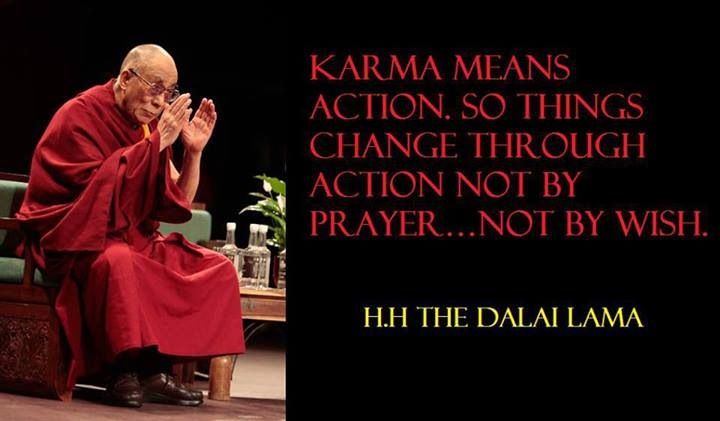Buddhism: What is Karma?

Karma in Buddhism is a largely misunderstood topic.
With the correct understanding of this law we can utilize it fully for the benefit of ourselves and all we come in contact with. While compassion and emptiness and an array of other Buddhist buzzwords are important karma is the most important concept to understand correctly because it is the law of cause and effect. While karma is correctly very often understood as action, what is most important to understand about that is it is the quality, intention and motivation of actions that create our karma and how these qualities of actions accumulate in our minds. These inner events shape our minds that then set up the conditions for future actions and so on it goes. So, learning how to pay attention and cultivate the conditions for right action is key to setting karma into motion in the best way possible. The way we do this is through mindfulness.
Mindfulness as the Key to Stopping Suffering
The predicaments we can find ourselves in do not happen overnight. They get set up through intentions and actions that accumulate and create the causes and conditions to arise. Some of these actions are societal some are familial and intergenerational and some is personal karma. Whatever the origin of the karmic situation we find ourselves in the way out is through mindfulness. One of the many purposes of meditation and sitting practices is observing the mind. The simple act of skillfully observing the mind over time can help us dissolve seeds of negativity in the mind. Disidentifying with thought does not mean that we become unattached to the events of our lives or that life has no meaning. On the contrary, it is through mindfulness we learn to see the inner workings of the mind and work to purify it so that we take responsibility for our actions.
In Buddhism, while we do investigate the nature of reality and learn the inherent emptiness of self and the impermanence of all things that does not mean things are meaningless. We are responsible for our lives, our relationships, our children and our world. Through intentional mindfulness as we root out the seeds of toxic anger, hatred, greed and so on. Then our actions become imbued with meaning of generosity, graciousness, kindness and love. The is the root of karma. Moment by moment as we continue to recondition our minds and take actions rooted in these positive qualities we create good karma that radiates from inside of us to our world and everyone in it. It is through this moment to moment practice that we come to understand that past unskillful actions rooted in the negative seeds lose their karmic power and our present moments begin to reach forward to create our future.
Here is a very short video snippet from Templeton Prize, H.H. Dalai Lama on karma
Lovingkindess and Karma
As we practice lovingkindness meditation and other practices that extend compassion to all beings we clear the way for positive actions and we learn something else: all other beings have the same promise of good karma that we do. All actions taken by others through ignorance of karmic law can be intervened by creating now good karma in these present moment. This is so important because when we are struggling with forgiveness and we don't understand the implications of karma we may secretly wish for revenge mostly because we don't understand our options. Beyond mere acceptance the law of karma teaches us that lovingkindness for all beings means all even the people who have hurt us or have done terrible things. Not because of a guilt laden command to forgive but step buy step through understand how 1) Our inner motivations affect our actions and we are either purifying our minds so our actions are pure and creating good karma for ourselves and those around us or 2) We are spinning in negative thoughts which will produce negative actions and create negative karma for ourselves. As all things are connected one of the results is not getting the message out to all beings even our "enemies" is that salvation is not only possible but necessary for the enlightenment of all. We cannot wish enlightenment for ourselves and wish revenge for our enemies. It will never work. I recently heard at a talk at Community Meditation Center where the teacher said, "you can take someone through the justice system without hatred in your heart." Or as the Dalai Lama says "I defeat my enemies when I make them my friends."

And many times more powerful than giving a gift even to the Buddha and the whole order of enlightened disciples is one moment in which the mind is fully concentrated on extending thoughts of lovingkindness toward all beings. When we genuinely open our hearts, the deep feeling of our connectedness to all beings is a tremendously effective force, which can then motivate a wide variety of skillful actions. ~Joseph Goldstein, Karma: Rhythmic Return to Harmony
Conclusion
This is a process so it is, as alway, most important to begin with compassion for oneself. No need to push ourselves because as we understand how the law of karma works and we understand why it is so important our practice, motivation and our actions will follow. Until next time...
What do you think?

@soulsistashakti is a musical artist and writer based in NYC as well as a practitioner of Buddhist teachings. You can check out my music on my FB artist page at https://www.facebook.com/soulsistashakti
Recent Posts
Meditation and Buddhism - The Fascinating and Awesome Power of Om Mani Padme Hum
The Magic of Flow and Why Hacks Are Bunk - Part 2
Buddhism: Trauma, Psychedelics and Meditation
great post man
Thanks
Thank you for the resteem my friend
I agree you reap what you sow. I like that line "I defeat my enemies when I make them my friends."
Easier said than done :)